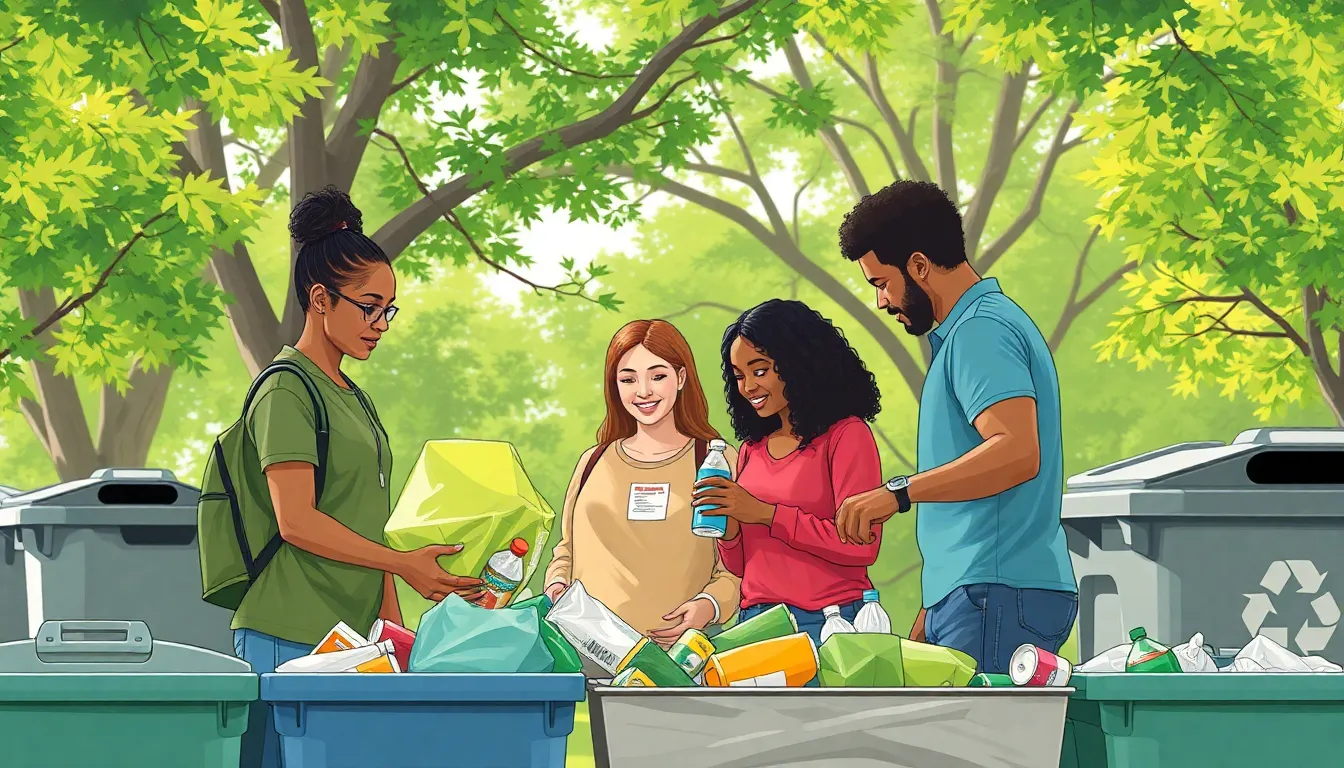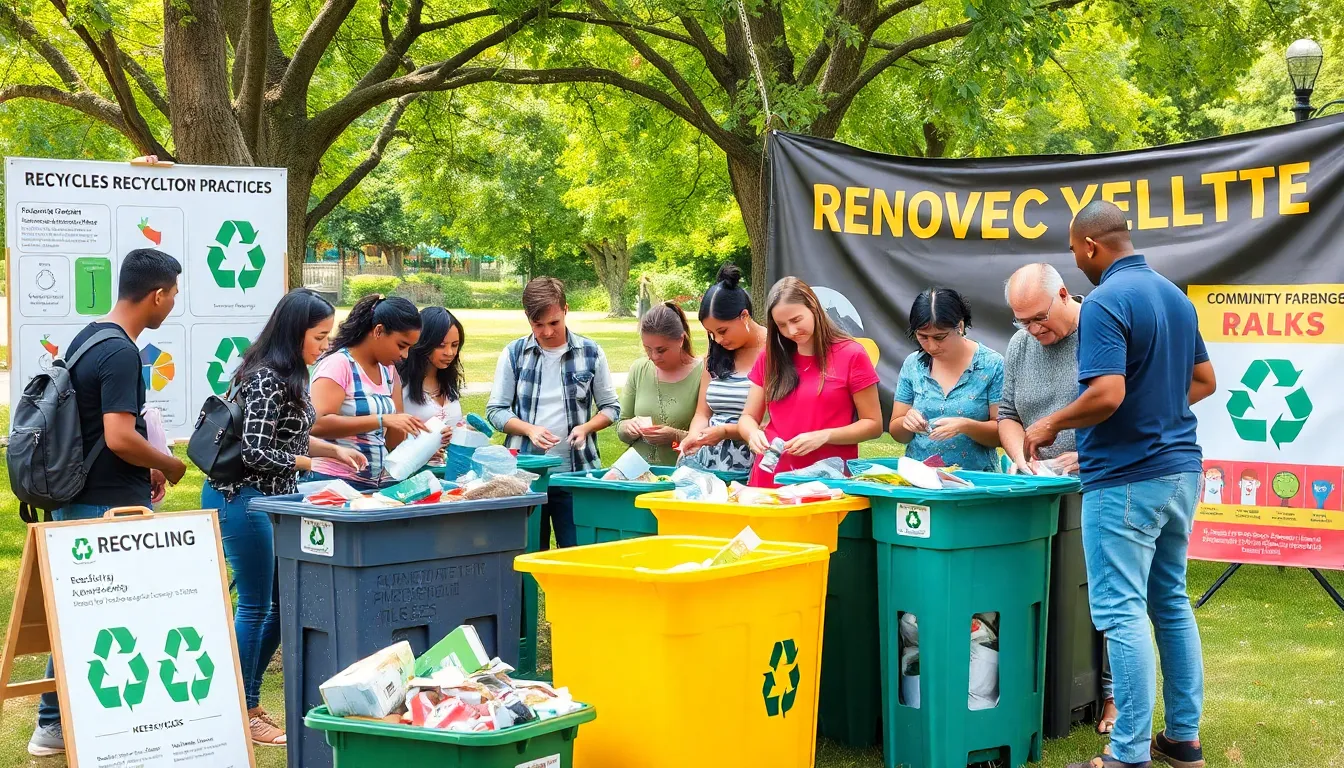In a world where plastic seems to outnumber people, recycling partnerships are the superheroes we didn’t know we needed. Imagine a dynamic duo—businesses and communities teaming up to tackle waste like Batman and Robin, but with more cardboard and fewer capes. These collaborations not only help save the planet but also turn trash into treasure, all while giving the environment a much-needed hug.
Table of Contents
ToggleOverview Of Recycling Partnerships
Recycling partnerships play a crucial role in tackling the plastic waste crisis. Businesses align with local communities to establish effective recycling programs. Such collaborations create pathways for the transformation of waste into reusable materials. They enhance the recycling rates, turning potential landfill waste into valuable resources.
Companies engage with municipal organizations to expand recycling initiatives. Through shared resources, they increase access to recycling options for consumers. Educational campaigns often accompany these programs, ensuring community awareness about proper recycling practices. Environmental benefits emerge as more materials get diverted from landfills, contributing to sustainability.
Collaboration extends beyond local communities to include non-profit organizations focused on environmental conservation. These partnerships amplify the impact of recycling efforts at a broader scale. They showcase innovative solutions, such as upcycling programs and composting initiatives, that further reduce waste generation.
Successful recycling partnerships frequently rely on data-driven strategies to measure effectiveness. Companies track progress through metrics like increased recycling volumes and reduced contamination rates. Such evaluations inform continuous improvement, allowing stakeholders to adjust strategies as necessary.
As these partnerships grow, they inspire other businesses to participate. Larger corporations often join forces with smaller entities, fostering a spirit of teamwork within the industry. Networking plays a key role in establishing these connections, leading to more expansive recycling programs.
Ultimately, recycling partnerships exemplify collaboration between various sectors. They demonstrate how joint efforts can significantly benefit the environment while also supporting local economies. Each partnership strengthens the framework for sustainable waste management practices.
Benefits Of Recycling Partnerships

Recycling partnerships provide numerous advantages that enhance both environmental sustainability and economic viability. These collaborations play a critical role in boosting recycling efforts and reducing waste.
Environmental Impact
Recycling partnerships significantly reduce waste sent to landfills. By diverting materials through structured initiatives, they promote resource conservation and minimize pollution. Educational campaigns increase community awareness about proper recycling practices, leading to higher participation rates. Partnerships often introduce innovative methods like upcycling and composting, further enhancing environmental benefits. These initiatives directly contribute to decreasing the carbon footprint associated with waste management. Effective partnerships support sustainable practices that foster a healthier ecosystem for future generations.
Economic Advantages
Economic benefits arise from the successful implementation of recycling partnerships. Businesses experience reduced waste disposal costs as recycling efforts eliminate the need for extensive landfill usage. Communities gain through job creation in recycling facilities and related industries, driving local economies. Cost savings materialize when organizations collaborate to streamline recycling processes and reduce material procurement needs. Furthermore, increased recycling rates can enhance market demand for recycled materials, providing additional revenue streams. Overall, these partnerships foster economic growth while supporting sustainable development initiatives.
Key Players In Recycling Partnerships
Effective recycling partnerships rely on collaboration among various stakeholders, including government bodies, private companies, and non-profit organizations. Each player contributes uniquely to improving recycling efforts.
Government Involvement
Government agencies play a pivotal role in recycling partnerships. They establish regulations that support waste management practices and promote sustainability initiatives. Local municipalities often provide resources and funding to enhance recycling programs. Data-driven policies help identify key areas for improvement and measure program success. Collaborative efforts with local businesses foster educational campaigns, increasing community awareness about proper recycling methods. Ultimately, comprehensive policies set the groundwork for successful recycling initiatives.
Private Sector Contributions
Private companies significantly contribute to recycling partnerships through innovation and investment. Many businesses develop advanced recycling technologies that improve processing efficiency, transforming waste into valuable resources. Collaborations with local communities expand access to recycling facilities and services. Businesses often engage in outreach efforts that educate consumers on sustainable practices. Job creation in recycling industries further showcases their commitment to environmental responsibility. By working together, private sector organizations bolster recycling rates and promote a circular economy.
Successful Case Studies
Numerous successful recycling partnerships showcase effective strategies in waste management. These collaborations span local initiatives and global efforts, demonstrating the power of teamwork in tackling plastic waste.
Local Initiatives
Community-focused projects highlight the impact of local recycling partnerships. A notable example is the partnership between a municipal government and local businesses in recycling education. They established a program that provides clear guidelines on proper recycling methods, leading to a 30% increase in local recycling rates. Residents also received access to new recycling bins, enhancing convenience. Community events, such as recycling drives, engaged residents and reinforced the importance of responsible waste management. These initiatives empower individuals while fostering a culture of environmental stewardship.
Global Collaborations
On a larger scale, international recycling partnerships illustrate innovative approaches to sustainability challenges. One prominent example is the collaboration among various countries under the Global Plastic Action Partnership. This initiative promotes sharing resources and best practices to enhance recycling infrastructure worldwide. It targets developing nations, focusing on building efficient recycling systems and reducing plastic waste. Partners contribute by exchanging technology and expertise, driving significant improvements in recycling rates across regions. The partnership yields economic benefits, opening markets for recycled materials and encouraging investment in green technologies.
Challenges Faced By Recycling Partnerships
Recycling partnerships encounter several challenges that can hinder their effectiveness. Communication issues often arise between stakeholders, including businesses and municipal organizations. These gaps in understanding can lead to misaligned goals and reduced collaboration.
Funding limitations frequently obstruct the growth of recycling initiatives. Many organizations rely on grants or government support, but these resources can be scarce or unpredictable. Without adequate funding, programs may struggle to maintain operations and promote community involvement.
Additionally, public awareness remains a significant barrier. Many individuals lack knowledge about proper recycling practices, leading to contamination in recycling streams. Education campaigns are essential, yet they require resources and consistent outreach efforts to foster engagement.
Logistical challenges also contribute to the difficulties faced by recycling partnerships. Many organizations must address transportation and processing issues, affecting the efficiency of recycling efforts. Access to advanced recycling technologies can be limited, complicating operations further.
Data collection poses another challenge. Measuring the success of recycling initiatives often relies on accurate data. Many partnerships lack sufficient tools or methods for tracking progress, making it difficult to refine strategies and prove effectiveness.
Collaboration among diverse stakeholders can sometimes lead to conflicting priorities. Non-profit organizations, government agencies, and private companies may prioritize different objectives. Aligning these interests is crucial for successful partnerships and effective waste management strategies.
Overall, addressing these challenges requires ongoing commitment, open communication, and innovative solutions. Recycling partnerships need to adapt and evolve, ensuring they effectively combat the growing plastic waste crisis.
Future Trends In Recycling Partnerships
Emerging technologies play a pivotal role in shaping recycling partnerships. Innovations such as artificial intelligence and blockchain enhance sorting efficiency and tracking of materials. Increased automation in recycling facilities can significantly reduce processing times, improving overall effectiveness.
Collaboration between diverse stakeholders is becoming more essential. Companies, municipalities, and non-profits are now working more closely to establish comprehensive recycling programs. Coordinated efforts lead to higher community engagement and awareness through educational campaigns, raising participation rates significantly.
Data analytics is set to drive decision-making in future partnerships. Organizations can leverage data to measure program success and identify areas needing improvement. By utilizing data-driven strategies, recycling partnerships align their objectives and maximize their impact.
Sustainability will directly influence partnership dynamics. Organizations increasingly prioritize projects that contribute to circular economies and environmental goals. Green certifications and eco-labeling become vital for businesses looking to partner effectively while demonstrating commitment to sustainability.
Global collaboration trends will also evolve. Partnerships will bridge gaps between developed and developing nations, sharing best practices in waste management. Innovative global initiatives will focus on scalable solutions that promote access to recycling technologies.
Finally, funding models are likely to diversify. As traditional grants may not always suffice, public-private partnerships could become more common. These collaborations enable businesses to invest in long-term recycling solutions while benefiting from shared resources and knowledge.
Recycling partnerships represent a vital strategy in the fight against plastic waste. By uniting businesses, communities, and non-profit organizations, these collaborations create effective recycling programs that benefit the environment and the economy. The shared commitment to sustainability fosters innovation and drives higher recycling rates while reducing landfill waste.
As technology continues to evolve, the potential for these partnerships to enhance recycling efforts will only grow. Ongoing collaboration and data-driven strategies will pave the way for more efficient waste management solutions. This collective approach not only addresses current challenges but also lays the groundwork for a sustainable future, ensuring a healthier planet for generations to come.





